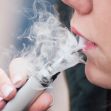In a significant development for public health and tobacco regulation, the U.S. Supreme Court, on Monday, January 7, 2024, decided not to review a challenge against California's ban on flavored tobacco products. This decision effectively upholds the voter-approved measure, marking a pivotal moment in the ongoing battle over tobacco product regulation in the United States.
The challenge was brought forth by R.J. Reynolds Tobacco Company, a subsidiary of British American Tobacco, against California's law prohibiting the sale of flavored tobacco products. This law, signed by Democratic Governor Gavin Newsom in 2020, was a response to rising concerns about increasing e-cigarette and tobacco usage among teenagers. The ban includes a wide range of products, from menthol cigarettes to cotton candy-flavored vaping items.
After the law's enactment, its implementation faced delays due to a referendum initiated by a tobacco industry coalition. However, in November 2022, Proposition 31, which upheld the ban, received overwhelming support from California voters. Following this, R.J. Reynolds and other plaintiffs filed a lawsuit contending that the federal Tobacco Control Act, enforced by the FDA, preempts state and local regulations banning flavored tobacco product sales.
A federal judge, however, dismissed these arguments, a stance later upheld by the 9th U.S. Circuit Court of Appeals. This decision was based on a precedent set by a similar ruling regarding a flavored tobacco ban in Los Angeles County.
The Supreme Court's refusal to hear the appeal signifies a substantial endorsement of states' rights to impose stricter tobacco regulations than those at the federal level. California Attorney General Rob Bonta hailed the decision as "excellent news," emphasizing the state's commitment to combating addiction and safeguarding public health.
California's law positions it as the second state, following Massachusetts in 2019, to implement a comprehensive ban on all flavored tobacco product sales. This move is part of a broader trend, with several states and municipalities introducing restrictions on flavored vaping products.
At the federal level, the U.S. Food and Drug Administration (FDA) has regulated e-cigarettes and flavored tobacco actively. In 2020, the FDA banned all flavors except tobacco and menthol in cartridge-based e-cigarettes like Juul. Furthermore, the FDA proposed banning menthol cigarettes and flavored cigars in April 2022, though these rules are still pending finalization.






